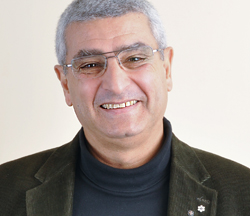 How does PCSK9 function and what is the impact of this protein on cardiovascular disease? A research team coordinated by Dr. Nabil G. Seidah, researcher at the IRCM, has been formed to answer this question. The Fondation Leducq is supporting this transatlantic project by investing $6 million over five years.
How does PCSK9 function and what is the impact of this protein on cardiovascular disease? A research team coordinated by Dr. Nabil G. Seidah, researcher at the IRCM, has been formed to answer this question. The Fondation Leducq is supporting this transatlantic project by investing $6 million over five years.
Dr. Seidah is a pioneer in the field of research on PCSK9, the ninth member of the proprotein convertase family that was discovered in his laboratory. In 2003, his team, in collaboration with French researchers, discovered that PCSK9 plays a key role in regulating cholesterol. This was one of the most exciting developments in cardiovascular research in the last decade.
“We now know that PCSK9 regulates bad cholesterol, known as LDL-cholesterol,” explains Dr. Seidah, Director of the Biochemical Neuroendocrinology research unit at the IRCM. “We believe that inhibiting the function of PCSK9 can lower LDL-cholesterol levels. Clinical trials are currently underway to test PCSK9-inhibitors that could eventually supplement or even replace statins, the most prescribed cholesterol-lowering drug.”
“However, we still do not understand exactly how PSCK9 functions,” says Dr. Seidah. “How does this protein act and what are the risks associated to its inhibition? These are questions our research team will attempt to answer, which is precisely why the Fondation Leducq decided to support our project. In fact, we will focus on the understanding of this protein’s biology and its role in hypercholesterolemia and cardiovascular disease.”
To tackle this issue, Dr. Seidah assembled an international, multidisciplinary team of experts. The researchers will address many of the current knowledge gaps surrounding PCSK9 biology. This collaboration between scientists with an extensive track record in the study of PCSK9 represents a true working synergy between existing successful laboratories that will result in the integration of a critical mass of knowledge for the benefit of patients and society.
“By combining state-of-the-art technologies and extensive clinical expertise, the research team will define the functions and physiological roles of PCSK9 in relation to risk, manifestations and management of cardiovascular disease,” adds Dr. Seidah.
“The knowledge generated by this project will have an immense impact on the understanding and treatment of cardiovascular disease, and will be highly valuable to develop new therapeutic approaches,” says Dr. David Tancredi, Fondation Leducq’s Scientific Director. “The Fondation Leducq is therefore proud to support this project and participate, along with this team of experienced researchers, in the advancement of knowledge in this field.”
According to the World Health Organization, cardiovascular disease is the single leading cause of death worldwide, with annual deaths expected to reach 23.3 million by 2030.
About the team
The team includes 16 basic and clinical scientists from six institutions in Canada (IRCM, Université de Sherbrooke, McMaster University), France (Université de Nantes, Hôpital Bichat – Claude-Bernard) and Sweden (Karolinska Institutet). These researchers are keenly interested in PCSK9 and possess a unique array of complementary expertise in cardiovascular and population epidemiology, cardiovascular and metabolic phenotyping, genetics, molecular and cell biology, protein and medicinal chemistry, mass spectrometry and proteomics, generation and phenotyping of animal models, pathophysiology and translational research.
About Nabil G. Seidah
Nabil G. Seidah obtained his PhD in chemistry from Georgetown University in Washington, DC (USA). He is a Full IRCM Research Professor, Director of the Biochemical Neuroendocrinology research unit, and Director of the Cardiovascular and Metabolic Diseases research division at the IRCM. Dr. Seidah is a full research professor in the Department of Medicine (accreditation in the Molecular Biology and Biochemistry departments) at the Université de Montréal. He is also Adjunct Professor in the Department of Medicine (Division of Experimental Medicine) at McGill University. He holds a Canada Research Chair in Precursor Proteolysis. In addition to receiving the 2011 Wilder-Penfield Prix du Québec, Dr. Seidah is also a Member of the Order of Canada, Officer of the Ordre national du Québec, and Fellow of the Royal Society of Canada. For more information, visit www.ircm.qc.ca/seidah.
December 13, 2013
